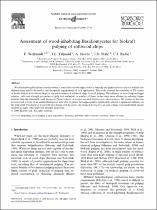 ResearchSpace
ResearchSpace
Assessment of wood-inhabiting Basidiomycetes for biokraft pulping of softwood chips
JavaScript is disabled for your browser. Some features of this site may not work without it.
- ResearchSpace
- →
- Research Publications/Outputs
- →
- Journal Articles
- →
- View Item
| dc.contributor.author |
Wolfaardt, F

|
en_US |
| dc.contributor.author |
Taljaard, JL

|
en_US |
| dc.contributor.author |
Jacobs, A

|
en_US |
| dc.contributor.author |
Male, JR

|
en_US |
| dc.contributor.author |
Rabie, CJ

|
en_US |
| dc.date.accessioned | 2007-02-06T13:55:14Z | en_US |
| dc.date.accessioned | 2007-06-07T10:03:03Z | |
| dc.date.available | 2007-02-06T13:55:14Z | en_US |
| dc.date.available | 2007-06-07T10:03:03Z | |
| dc.date.copyright | en_US | |
| dc.date.issued | 2004-10 | en_US |
| dc.identifier.citation | Wolfaardt, F, et al. 2004. Assessment of wood-inhabiting Basidiomycetes for biokraft pulping of softwood chips. Bioresource Technology, vol 95(1), pp 25-30 | en_US |
| dc.identifier.issn | 0960-8524 | en_US |
| dc.identifier.uri | http://hdl.handle.net/10204/1564 | en_US |
| dc.identifier.uri | http://hdl.handle.net/10204/1564 | |
| dc.description.abstract | Wood-inhabiting Basidiomycetes have been screened for various applications in the pulp and paper industry and it is evident that different fungi need to be used to suit the specific requirements of each application. This study assessed the suitability of 278 strains of South African wood-decay fungi for the pre-treatment of softwood chips for kraft pulping. The influence of these fungi on kappa number, yield and strength properties of pulp was evaluated. A number of these strains were more efficient in reducing kappa number than the frequently used strains of Phanerochaete chrysosporium and Ceriporiopsis subvermispora. Six strains of Stereum hirsutum and a strain of an unidentified species were able to reduce the kappa number significantly without a significant influence on the pulp yield. Treatment of wood with two strains of S. hirsutum, one strain of Peniophora sp. and a strain of an unidentified species resulted in paper with improved strength properties. This paper demonstrates the importance of screening to select superior fungal strains for use in biopulping. Under the specific pulping conditions of the screening trials, 38 strains of white-rot fungi were tested that were more suitable than the reference strains of P. chrysosporium and C. subvermispora. The importance of mini pulping experiments to select the strains with the greatest benefit in a biokraft pulping process was also evident. | en_US |
| dc.format.extent | 259994 bytes | en_US |
| dc.format.mimetype | application/pdf | en_US |
| dc.language.iso | en | en_US |
| dc.publisher | Elsvier Science Ltd | en_US |
| dc.rights | Copyright: 2004 Elsevier Science Ltd | en_US |
| dc.source | en_US | |
| dc.subject | Wood-inhabiting basidomycetes | en_US |
| dc.subject | Softwood chips | en_US |
| dc.subject | Biokraft pulping | en_US |
| dc.subject | White-rot fungi | en_US |
| dc.subject | Agricultural engineering | en_US |
| dc.subject | Applied microbiology | en_US |
| dc.subject | Kappa number | en_US |
| dc.title | Assessment of wood-inhabiting Basidiomycetes for biokraft pulping of softwood chips | en_US |
| dc.type | Article | en_US |
| dc.identifier.apacitation | Wolfaardt, F., Taljaard, J., Jacobs, A., Male, J., & Rabie, C. (2004). Assessment of wood-inhabiting Basidiomycetes for biokraft pulping of softwood chips. http://hdl.handle.net/10204/1564 | en_ZA |
| dc.identifier.chicagocitation | Wolfaardt, F, JL Taljaard, A Jacobs, JR Male, and CJ Rabie "Assessment of wood-inhabiting Basidiomycetes for biokraft pulping of softwood chips." (2004) http://hdl.handle.net/10204/1564 | en_ZA |
| dc.identifier.vancouvercitation | Wolfaardt F, Taljaard J, Jacobs A, Male J, Rabie C. Assessment of wood-inhabiting Basidiomycetes for biokraft pulping of softwood chips. 2004; http://hdl.handle.net/10204/1564. | en_ZA |
| dc.identifier.ris | TY - Article AU - Wolfaardt, F AU - Taljaard, JL AU - Jacobs, A AU - Male, JR AU - Rabie, CJ AB - Wood-inhabiting Basidiomycetes have been screened for various applications in the pulp and paper industry and it is evident that different fungi need to be used to suit the specific requirements of each application. This study assessed the suitability of 278 strains of South African wood-decay fungi for the pre-treatment of softwood chips for kraft pulping. The influence of these fungi on kappa number, yield and strength properties of pulp was evaluated. A number of these strains were more efficient in reducing kappa number than the frequently used strains of Phanerochaete chrysosporium and Ceriporiopsis subvermispora. Six strains of Stereum hirsutum and a strain of an unidentified species were able to reduce the kappa number significantly without a significant influence on the pulp yield. Treatment of wood with two strains of S. hirsutum, one strain of Peniophora sp. and a strain of an unidentified species resulted in paper with improved strength properties. This paper demonstrates the importance of screening to select superior fungal strains for use in biopulping. Under the specific pulping conditions of the screening trials, 38 strains of white-rot fungi were tested that were more suitable than the reference strains of P. chrysosporium and C. subvermispora. The importance of mini pulping experiments to select the strains with the greatest benefit in a biokraft pulping process was also evident. DA - 2004-10 DB - ResearchSpace DP - CSIR KW - Wood-inhabiting basidomycetes KW - Softwood chips KW - Biokraft pulping KW - White-rot fungi KW - Agricultural engineering KW - Applied microbiology KW - Kappa number LK - https://researchspace.csir.co.za PY - 2004 SM - 0960-8524 T1 - Assessment of wood-inhabiting Basidiomycetes for biokraft pulping of softwood chips TI - Assessment of wood-inhabiting Basidiomycetes for biokraft pulping of softwood chips UR - http://hdl.handle.net/10204/1564 ER - | en_ZA |





